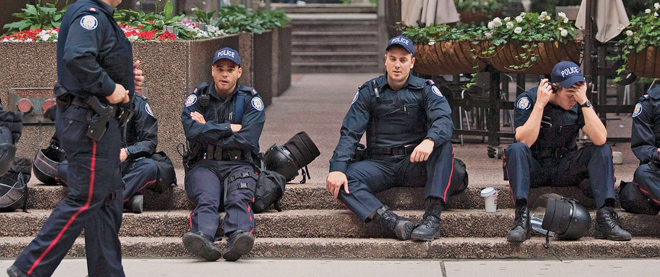A tough-on-crime bill that goes too far
With Canada’s crime rate at its lowest since the 1970s, why is the government spending more money on throwing people in jail?
THE CANADIAN PRESS/Jacques Boissinot
Share

How tough is tough enough when it comes to crime?
A Maclean’s investigation this week by Ken MacQueen and Patricia Treble (“Too many cops?”) offers a surprising look at the unintended consequences of Canada’s recent tough-on-crime agenda.
The overall crime rate in Canada is at its lowest level since the early 1970s, and serious crime is similarly falling. This is good news, of course. And it may in large part be due to the fact that police staffing levels are at a 30-year high nationwide.
And yet MacQueen and Treble uncover plenty of statistical and anecdotal evidence to suggest it may be possible to have too many cops on the street. Beside the obvious budgetary issues, local constabularies around the country are spending a disproportionate amount of their time on increasingly minor offences in an apparent effort to keep busy. Drug possession and traffic violations appear to be the only significant growth areas in the national criminal portfolio.
With this as background, the Harper government is on the verge of another major overhaul of the justice system aimed at making the criminal justice system even tougher. Such a move should give all law-abiding Canadians pause for thought.
Crime is a major standard-of-living issue, and the Conservatives’ law-and-order platform has resonated strongly with the Canadian public. As part of its successful 2011 campaign, the Harper government promised to combine 11 separate pieces of crime legislation into a massive omnibus bill to be presented this fall. With a majority now in hand, passage of the bill seems a foregone conclusion. But it’s necessary to differentiate between good public policy and political grandstanding.
As is the nature of omnibus legislation, the Tories’ crime bill is a mixed bag. It properly updates the ability of the police to intercept communications between criminals. In our information age, it makes little sense to restrict wiretapping efforts to phones that are still connected by wire. And to respond to the challenges of gang cases, the bill contains reasonable measures to streamline mega-trials. It would also allow victims of terrorism to sue the perpetrators.
But the mega-bill also prescribes controversial new rules regarding minimum jail time for a wide variety of offences. Automatic sentencing procedures may play well at political rallies or in platform books, but rigidity of this sort inevitably leads to grotesque absurdities in the courtroom. Consider the example of Tamara Cartwright, the 41-year-old mother of four featured in our story this week, who naively put four grams of home-grown marijuana in an envelope and found herself charged with the serious offence of trafficking. Under the omnibus legislation, she would face a minimum one-year jail term, rather than the six-month conditional sentence she actually received.
At its annual meeting this week, the Canadian Bar Association urged the government to include a “safety valve” in its new sentencing procedures, as is the case in most Western countries, to permit judges discretion to ignore mandatory minimum-sentencing rules in situations where this could lead to “serious injustices.” Justice Minister Rob Nicholson rejected the request. “It is our job to give guidance to the courts,” he said sternly in Halifax.
The obvious result of these new rules will be to create a flood of Canadians into the prison system—many first-time offenders. If there was evidence that filling prisons with minor criminals was a successful method for fighting crime, then this scenario might make some sense. But such an approach clearly hasn’t worked in the United States, despite decades of effort. In fact, many states are now emptying their jails for budgetary reasons.
It is also worth noting that as a political device, the tough-on-crime omnibus bill is starting to look a bit long in the tooth. Recall that in 2008, the then-minority government of Stephen Harper packaged five separate crime bills into its Tackling Violent Crime Act and rammed it through Parliament as a confidence issue. Now, after three years of evidence that the violent crime rate is falling precipitously—and with cops in many cities forced to spend their shifts running speed traps and busting pot-smoking mothers—the government is simply repeating itself for reasons of political expediency.
Serious crime requires a serious response—there is no debate there. But we also need to remember that the iconic statue of justice holds a scale in her hand for a reason: justice requires balance. The government’s criminal justice policy is in danger of falling out of balance.